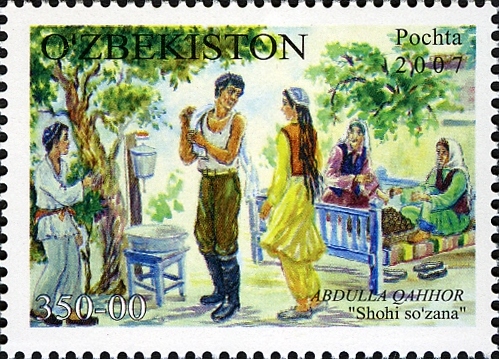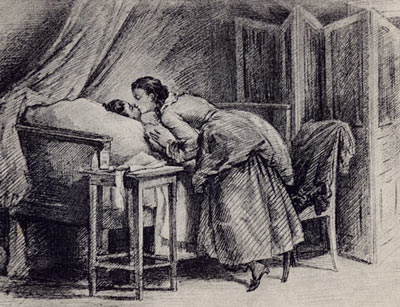|
Abdulla Qahhor
Abdulla Qahhor (sometimes spelled Abdulla Kahhar in English) ( uz, Abdulla Qahhor, Абдулла Қаҳҳор) (September 17, 1907 – May 24, 1968) was a Soviet and Uzbek novelist, short story writer, poet, playwright, and literary translator. He is best remembered as the author of the 1951 novel ''Qoʻshchinor chiroqlari'' (''The Lights of Qoʻshchinor'') and the 1958 story ''Sinchalak''. Qahhor is considered to be one of the best Uzbek writers of the 20th century and has been called the "Chekhov" of Uzbeks. He received the prestigious Stalin Prize in 1952 and a National Writer of the Uzbek SSR award in 1967. In 2000, Qahhor was posthumously awarded the National Order of Merit ( uz, Buyuk xizmatlari uchun), one of independent Uzbekistan's most prestigious awards. Life Abdulla Qahhor was born on September 17, 1907, in Kokand. His father was a blacksmith and moved from place to place for work. Qahhor attended several schools in Kokand and other nearby villages. From 1922 to 1924, ... [...More Info...] [...Related Items...] OR: [Wikipedia] [Google] [Baidu] |
Infobox Writer/doc
An infobox is a digital or physical table used to collect and present a subset of information about its subject, such as a document. It is a structured document containing a set of attribute–value pairs, and in Wikipedia represents a summary of information about the subject of an article. In this way, they are comparable to data tables in some aspects. When presented within the larger document it summarizes, an infobox is often presented in a sidebar format. An infobox may be implemented in another document by transcluding it into that document and specifying some or all of the attribute–value pairs associated with that infobox, known as parameterization. Wikipedia An infobox may be used to summarize the information of an article on Wikipedia. They are used on similar articles to ensure consistency of presentation by using a common format. Originally, infoboxes (and templates in general) were used for page layout purposes. An infobox may be transcluded into an article by ... [...More Info...] [...Related Items...] OR: [Wikipedia] [Google] [Baidu] |
Tashkent
Tashkent (, uz, Toshkent, Тошкент/, ) (from russian: Ташкент), or Toshkent (; ), also historically known as Chach is the capital and largest city of Uzbekistan. It is the most populous city in Central Asia, with a population of 2,909,500 (2022). It is in northeastern Uzbekistan, near the border with Kazakhstan. Tashkent comes from the Turkic ''tash'' and ''kent'', literally translated as "Stone City" or "City of Stones". Before Islamic influence started in the mid-8th century AD, Tashkent was influenced by the Sogdian and Turkic cultures. After Genghis Khan destroyed it in 1219, it was rebuilt and profited from the Silk Road. From the 18th to the 19th century, the city became an independent city-state, before being re-conquered by the Khanate of Kokand. In 1865, Tashkent fell to the Russian Empire; it became the capital of Russian Turkestan. In Soviet times, it witnessed major growth and demographic changes due to forced deportations from throughout the Sov ... [...More Info...] [...Related Items...] OR: [Wikipedia] [Google] [Baidu] |
War And Peace
''War and Peace'' (russian: Война и мир, translit=Voyna i mir; pre-reform Russian: ; ) is a literary work by the Russian author Leo Tolstoy that mixes fictional narrative with chapters on history and philosophy. It was first published serially, then published in its entirety in 1869. It is regarded as Tolstoy's finest literary achievement and remains an internationally praised classic of world literature. The novel chronicles the French invasion of Russia and the impact of the Napoleonic era on Tsarist society through the stories of five Russian aristocratic families. Portions of an earlier version, titled ''The Year 1805'', were serialized in ''The Russian Messenger'' from 1865 to 1867 before the novel was published in its entirety in 1869.Knowles, A. V. ''Leo Tolstoy'', Routledge 1997. Tolstoy said that the best Russian literature does not conform to standards and hence hesitated to classify ''War and Peace'', saying it is "not a novel, even less is it a poem, and ... [...More Info...] [...Related Items...] OR: [Wikipedia] [Google] [Baidu] |
The Government Inspector
''The Government Inspector'', also known as ''The Inspector General'' ( rus, links=no, Ревизор, Revizor, literally: "Inspector"), is a satirical play by Russian dramatist and novelist, Nikolai Gogol. Originally published in 1836, the play was revised for an 1842 edition. Based upon an anecdote allegedly recounted to Gogol by Pushkin, the play is a comedy of errors, satirizing human greed, stupidity, and the extensive political corruption of Imperial Russia. The dream-like scenes of the play, often mirroring each other, whirl in the endless vertigo of self-deception around the main character, Khlestakov, who personifies irresponsibility, light-mindedness, and absence of measure. "He is full of meaningless movement and meaningless fermentation incarnate, on a foundation of placidly ambitious inferiority" (D. S. Mirsky). The publication of the play led to a great outcry in the reactionary press. It took the personal intervention of Tsar Nicholas I to have the play staged, wi ... [...More Info...] [...Related Items...] OR: [Wikipedia] [Google] [Baidu] |
Marriage (play)
''Marriage'' (russian: «Женитьба», ''Zhenit'ba'') is a two-act play by the Russian writer Nikolai Gogol, which was written in 1832 and first published in 1842. Plot summary In the opening scene, a civil servant named Ivan Kuzmich Podkolyosin sits alone in his room smoking a pipe and contemplating marriage. He has hired a matchmaker (Fyokla Ivanovna), as was the custom in Russia at the time, to help find him a bride. As the two converse, the audience discovers that Podkolyosin has been in search of a bride for quite some time. The reason for his not being yet married, however, owes to his own indecisiveness rather than the lack of a suitable partner. In fact, Fyokla has found him a nice young woman named Agafya Tikhonovna. When Podkolyosin's friend Kochkaryov unexpectedly pays a visit and finds Fyokla at Podkolyosin's home, he learns for the first time of his friend's search for a bride. The fact that Podkolyosin has not mentioned it to his friend provides further proo ... [...More Info...] [...Related Items...] OR: [Wikipedia] [Google] [Baidu] |
The Captain's Daughter
''The Captain's Daughter'' (russian: «Капитанская дочка», Kapitanskaya dochka) is a historical novel by the Russian writer Alexander Pushkin. It was first published in 1836 in the fourth issue of the literary journal ''Sovremennik''. The novel is a romanticized account of Pugachev's Rebellion in 1773–1774. The title "The Captain's Daughter" has also been used to refer to a collection of stories, one of which was the actual novel. Plot Pyotr Andreyich Grinyov (the narrative is conducted on his behalf) is the only surviving child of a retired Imperial Army officer. When Pyotr turns 17, his father sends him into military service in Orenburg. While en route, Pyotr gets lost in a blizzard, but is rescued by a mysterious man. As a token of his gratitude, Pyotr gives the guide his hareskin coat. Arriving in Orenburg, Pyotr reports to his commanding officer and is assigned to serve at Fort Belogorsky under Captain Ivan Mironov. The "fort" is little more than a fence ... [...More Info...] [...Related Items...] OR: [Wikipedia] [Google] [Baidu] |
Uzbek Language
Uzbek (''Oʻzbekcha, Oʻzbek tili or Ўзбекча, Ўзбек тили''), formerly known as ''Turki'' or ''Western Turki'', is a Turkic language spoken by Uzbeks. It is the official, and national language of Uzbekistan. Uzbek is spoken as either native or second language by 44 million people around the world (L1+L2), having some 34 million speakers in Uzbekistan, 4.5 million in Afghanistan, and around 5 million in the rest of Central Asia, making it the second-most widely spoken Turkic language after Turkish. Uzbek belongs to the Eastern Turkic or Karluk branch of the Turkic language family. External influences include Arabic, Persian and Russian. One of the most noticeable distinctions of Uzbek from other Turkic languages is the rounding of the vowel to , a feature that was influenced by Persian. Unlike other Turkic languages, vowel harmony is nigh-completely lost in modern Standard Uzbek, though it is (albeit somewhat less strictly) still observed in its dialects, as wel ... [...More Info...] [...Related Items...] OR: [Wikipedia] [Google] [Baidu] |
Nikolai Gogol
Nikolai Vasilyevich Gogol; uk, link=no, Мико́ла Васи́льович Го́голь, translit=Mykola Vasyliovych Hohol; (russian: Яновский; uk, Яновський, translit=Yanovskyi) ( – ) was a Russian novelist, short story writer and playwright of Ukrainian origin. Gogol was one of the first to use the technique of the grotesque, in works such as " The Nose", " Viy", "The Overcoat", and "Nevsky Prospekt". These stories, and others such as " Diary of a Madman", have also been noted for their proto-surrealist qualities. According to Viktor Shklovsky, Gogol's strange style of writing resembles the "ostranenie" technique of defamiliarization. His early works, such as ''Evenings on a Farm Near Dikanka'', were influenced by his Ukrainian upbringing, Ukrainian culture and folklore. His later writing satirised political corruption in the Russian Empire (''The Government Inspector'', '' Dead Souls''). The novel ''Taras Bulba'' (1835), the play ''Marriage ... [...More Info...] [...Related Items...] OR: [Wikipedia] [Google] [Baidu] |
Anton Chekhov
Anton Pavlovich Chekhov (; 29 January 1860 Old Style date 17 January. – 15 July 1904 Old Style date 2 July.) was a Russian playwright and short-story writer who is considered to be one of the greatest writers of all time. His career as a playwright produced four classics, and his best short stories are held in high esteem by writers and critics."Stories ... which are among the supreme achievements in prose narrative.Vodka miniatures, belching and angry cats George Steiner's review of ''The Undiscovered Chekhov'', in ''The Observer'', 13 May 2001. Retrieved 16 February 2007. Along with Henrik Ibsen and August Strindberg, Chekhov is often referred to as one of the three seminal figures in the birth of early modernism in the theatre. Chekhov was a physician by profession. "Medicine is my lawful wife", he once said, "and literature is my mistress." Chekhov renounced the theatre after the reception of ''The Seagull'' in 1896, but the play was revived to acclaim in 189 ... [...More Info...] [...Related Items...] OR: [Wikipedia] [Google] [Baidu] |
Alexander Pushkin
Alexander Sergeyevich Pushkin (; rus, links=no, Александр Сергеевич ПушкинIn pre-Revolutionary script, his name was written ., r=Aleksandr Sergeyevich Pushkin, p=ɐlʲɪkˈsandr sʲɪrˈɡʲe(j)ɪvʲɪtɕ ˈpuʂkʲɪn, a=ru-Pushkin.ogg; ) was a Russian poet, playwright, and novelist of the Romantic era.Basker, Michael. Pushkin and Romanticism. In Ferber, Michael, ed., ''A Companion to European Romanticism''. Oxford: Blackwell, 2005. He is considered by many to be the greatest Russian poetShort biography from University of Virginia . Retrieved 24 November 2006.Allan Rei ... [...More Info...] [...Related Items...] OR: [Wikipedia] [Google] [Baidu] |
Axis Powers
The Axis powers, ; it, Potenze dell'Asse ; ja, 枢軸国 ''Sūjikukoku'', group=nb originally called the Rome–Berlin Axis, was a military coalition that initiated World War II and fought against the Allies. Its principal members were Nazi Germany, the Kingdom of Italy, and the Empire of Japan. The Axis were united in their opposition to the Allies, but otherwise lacked comparable coordination and ideological cohesion. The Axis grew out of successive diplomatic efforts by Germany, Italy, and Japan to secure their own specific expansionist interests in the mid-1930s. The first step was the protocol signed by Germany and Italy in October 1936, after which Italian leader Benito Mussolini declared that all other European countries would thereafter rotate on the Rome–Berlin axis, thus creating the term "Axis". The following November saw the ratification of the Anti-Comintern Pact, an anti-communist treaty between Germany and Japan; Italy joined the Pact in 1937, follow ... [...More Info...] [...Related Items...] OR: [Wikipedia] [Google] [Baidu] |
Nazi Germany
Nazi Germany (lit. "National Socialist State"), ' (lit. "Nazi State") for short; also ' (lit. "National Socialist Germany") (officially known as the German Reich from 1933 until 1943, and the Greater German Reich from 1943 to 1945) was the German state between 1933 and 1945, when Adolf Hitler and the Nazi Party controlled the country, transforming it into a dictatorship. Under Hitler's rule, Germany quickly became a totalitarian state where nearly all aspects of life were controlled by the government. The Third Reich, meaning "Third Realm" or "Third Empire", alluded to the Nazi claim that Nazi Germany was the successor to the earlier Holy Roman Empire (800–1806) and German Empire (1871–1918). The Third Reich, which Hitler and the Nazis referred to as the Thousand-Year Reich, ended in May 1945 after just 12 years when the Allies defeated Germany, ending World War II in Europe. On 30 January 1933, Hitler was appointed chancellor of Germany, the head of gove ... [...More Info...] [...Related Items...] OR: [Wikipedia] [Google] [Baidu] |







.jpg)

